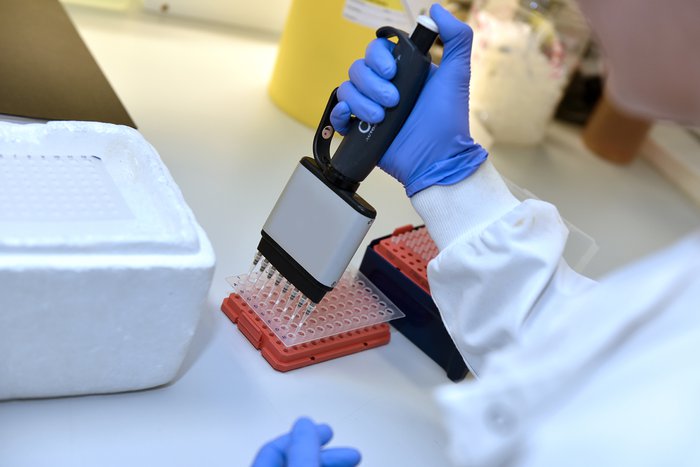The Road to Beating Myeloma
Professor Irene Ghobrial
Professor Irene Ghobrial is a Professor of Medicine at Harvard Medical School in the United States. She is a highly respected clinician-scientist in the field of myeloma. We asked Irene about the current state-of-play for myeloma and asked her how we’re going to beat blood cancer in a generation. In her words, this blog is what she said.

A radical shift in myeloma treatment
I trained as a myeloma specialist at New York Clinic 17 years ago and treating myeloma back then was a completely different picture. I still remember a time when the best tool I had to treat my patients was something called VAD chemotherapy (a combination treatment of vincristine, doxorubicin and dexamethasone). Many newer clinicians might not even know the drug combination existed! Honestly, treatment of myeloma in the last 15 years had changed completely. Back then, someone achieving complete remission from their disease following initial treatment was unheard of. Now we expect this to happen. The pace of change has been astounding. Over the last 15 years I’ve had: thalidomide, lenalidomide, bortezomib, RVd chemotherapy (a combination of Lenalidomide, Bortezomib, and Dexamethasone) all added to my tool kit and the responses are so great, I question whether I still need to be giving patients a stem cell transplant.
When I first started my career, we’d expect people to live with the disease for 3-5 years maximum. Now, people live much longer than this, but there’s still a way to go.
We’re treating myeloma too late
As much as treatment has come on during my time as a clinical researcher, there are still things we need to address. In particular, I believe that we’re treating myeloma too late. We’re waiting for people to develop symptoms and for people to have disease in several parts of their body to treat them. We wouldn’t turn around to someone with breast cancer and say “you have no symptoms, let’s wait until your disease spreads and we’ll then treat you”. You’d think any clinician were mad if they said that! But that’s been the reality in myeloma treatment and part of that is because we have such limited ways of being able to screen people for the disease.
Screening people at higher risk of developing the disease
We know certain people such as those of African descent and those with a family history of the disease are more at risk of developing myeloma and I’d like to see screening for these groups implemented. In the US, we have a study called the PROMISE study which is routinely doing this. It will show that several people have something called a “small monoclonal protein” which gives us a clue that they may go on to develop myeloma. What we can then do is monitor these individuals and start treating them before they have active disease. In addition to this, if we screen people for this protein that tells us they might develop the disease, there’s an opportunity to perhaps create a vaccine or another therapy to prevent this from happening which would allow us to achieve a cure in the early stages of the disease.
The problem of “treating too late” isn’t unique to myeloma. The way we treat cancer in general is very reactive rather that proactive. We often wait until people have symptoms and then react to it and we need to try and change this.

Tailoring treatment to the disease type
We also need to stop treating myeloma patients in the same way. Myeloma can be driven by several different changes in our genes. One common one is an “11,14 translocation” where two pieces of our chromosomes, which hold our DNA, decide to swap places and another is a “17p deletion” where a piece of DNA on chromosome 17 disappears. These two types of myeloma are triggered by different changes yet we treat and expect them to respond in the same way. That can’t be the best way to do things. Think of all the different types of lymphoma and how differently they’re treated. So, we need to create targeted therapies based on the make-up of someone’s cancer.
As well as targeted therapy, immunotherapy will also be important. We are beginning to harness our own immune system to fight cancers including myeloma but I think so far, we’ve just scratched the surface. I see immunotherapy playing a viral role on treating myeloma in the future.
Both of these things – earlier diagnosis and using more specific treatments will take as to a cure, and I really do believe we can get there.
An end to maintenance therapy?
In fact, we’re probably there for some people already. Nowadays, pretty much everyone with myeloma is given indefinite “maintenance therapy,” which is treatment to try and prevent the disease coming back, and to extend the period of time before patients’ relapse. But when I was treating patients 15 years ago, maintenance therapy didn’t exist. Some of those patients I treated 15 years ago weren’t offered maintenance therapy and 15 years later are living normal, healthy lives off any treatment and in complete remission of their disease. I can’t say they’re “cured” because I don’t know what the next 15 years will hold, but its looking good for them. There’s a very real chance that we’re giving some patients too much treatment but at the moment, we just can’t decipher who will relapse and who won’t which is why we give the treatment to everyone.
At the same time, I have patients I treated 15 years ago who had a sustained period off any treatment who did relapse. My assumption is that the “type” of myeloma will have been different between the patients who relapsed and the patients who didn’t, but our expertise isn’t there yet.

The road to a cure
In my opinion, a “cure” means people are off therapy, living a normal life and not worrying about the cancer they once had, and I do believe that by understanding more about the basic biology and by delving deeper into the genetic causes of myeloma, we’ll be able to achieve this. I reckon we’re only a few years away from understanding how genetic changes influence how someone’s disease is likely to progress, and I think this will again lead to a step change in the way we treat the disease. I think in a few years’ time, if people on maintenance therapy don’t have any residual disease left, and if we know the genetics of their tumour give them a “good” prognosis, we might be able to stop their treatment.
We must attract and retain the best minds
I feel hopeful that research will take us to a place where we can beat the disease, but we face problems trying to attract the best minds, and we also have a challenge trying to keep them in research. So many people leave academic medicine for industry jobs and a higher salary. So many researchers who are also clinicians are pulled in too many different directions. They’re overwhelmed with patients and we’re not giving them time to think and come up with ideas which is why people are leaving.
Historically, there was a culture in medicine that “succeeding” was working 36-hour shifts, and the harder you worked, the better you were at your job. This culture is changing, but there’s still more to be done, because it’s not good for anyone’s wellbeing and it’s not conducive to coming up with the big ideas that will allow us to cure myeloma.
There needs to be a culture shift in academia
We also need to change how we measure success in academia. At the moment, how good you are at your job is based on how many papers you write and how much money you bring in, which adds an additional layer of pressure to your job. We’ve known there needs to be a culture change for years and if we don’t change, it will be a big barrier to progress.
Charities like Blood Cancer UK are absolutely vital to take us to a place where we can beat diseases like myeloma. Donation of time, money and being part of clinical trials all take us closer to a day where I can cure my patients of their cancer. Charity funding allows us to take risks we wouldn’t be able to otherwise and allows us to work at a faster pace of discovery. Every pound (dollar!) matters and to me, as a researcher, it matters that people care.
